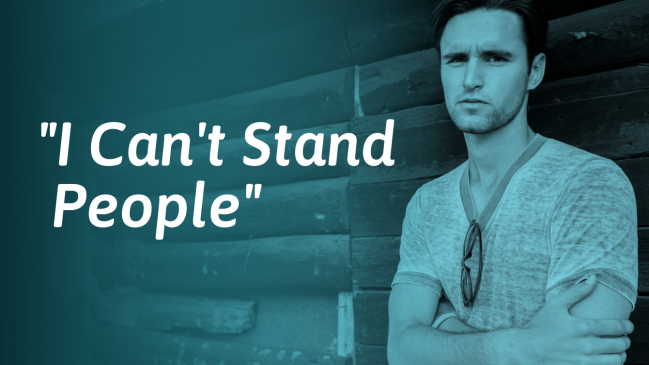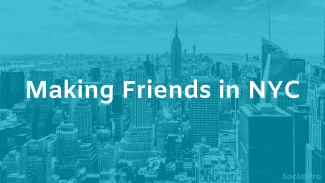“I can’t stand most people I meet. They either seem fake, shallow, stupid, or self-involved. Any advice on how to make friends when you hate everyone or aren’t a people person?”
While you won’t click with everyone, it’s statistically impossible that you actually hate everyone. There are almost 9 billion people in the world, so it’s highly likely that there are some people that you would like and relate to. It could be that you are too quick to judge others, are letting your cynicism get in the way, or that you’re just not interacting with enough people to find people you have things in common with.
This article will help you better understand why you hate people and what you can do when you want friends but feel as though you dislike everyone you meet.
Reasons for hating everyone
If you hate most people, you probably have your reasons. Negative interactions you’ve had with people who hurt you in the past may have tainted your view of humankind. It could also be a misunderstood part of your personality, like being introverted or shy. In some cases, low self-esteem or insecurities could be the true source of the problem. Read more here if you feel like your friends are useless.
Here are some of the reasons why you might hate other people: [1][2]
- Past experiences of being hurt, betrayed, let down, deceived, or rejected by people
- Being too quick to judge other people or look for their negative qualities
- Deciding you don’t like someone before you get to know them or give them a chance
- Assuming others won’t like you, or that trying to make friends will be a waste of time
- Feeling insecure, socially anxious, awkward, or lacking social skills
- Being introverted and feeling drained by social interactions
- Feeling overwhelmed or burned out because you have to interact with people often, e.g., as part of a demanding job
- Being unhappy with yourself or your life and unknowingly projecting onto other people
- Fears of intimacy or of letting other people in
It’s possible to overcome your dislike of people, but it might require doing a lot of work on yourself. You can’t change other people, but you can learn to control your own feelings, thoughts, and behavior. Even small changes can make it easier for you to see the good in others, find things in common with them, and begin to form connections. Below are 9 tips to overcome your hatred of others and begin making friends.
1. Identify and heal your relationship wounds
Being hurt, betrayed, or rejected by someone you loved can lead you to develop trust issues that can be mistaken for a dislike of other people. Being guarded, cynical, and too quick to judge other people may be a defense mechanism you use because you’ve been hurt in the past, but it can also keep you from making friends.
Here are some ways to identify and heal old relationship wounds:
- Who has hurt you the most in your life? What did you want or need from this person?
- How did this relationship change your view of others/yourself/your relationships?
- What kind of friendship or person would help you learn to trust or like people again?
- What can you do to seek this kind of friendship or person out?
- How can you be a better friend to yourself during times when you feel hurt or scared?
Our guides to overcoming trust issues with friends, overcoming the fear of making friends, and getting over losing a best friend have advice on healing relationship wounds.
2. Figure out if you’re an introvert
You might assume you’re just not a “people person” when you are really just an introvert. People who are introverted are often more shy, quiet, and reserved, and many find social interactions draining and overwhelming.[4] If this sounds like you, lightening up your social calendar and changing your routine can help make your interactions less tiring and more enjoyable.
Here are some tips on how introverts can improve their interactions with people:[4]
- Pace yourself and take time to “warm up” before interacting with people
- Carve out alone time after a social event to recharge your batteries
- Give yourself permission to say no to social events you don’t need/want to attend
- Don’t feel the need to “match” the energy levels of an extroverted person
- Aim for more 1:1 or small group interactions instead of large groups
You may find our guide to being more social as an introvert helpful.
3. Be friendlier to others
Because hating everyone is often the result of having a lot of negative interactions with people in the past, rewriting these experiences with more positive interactions is an important step. Any interaction involves two people who feed off of one another’s emotions and energy. When someone feels liked and accepted by you, they are more likely to form a positive impression of you and be friendly in a conversation.[5]
Here are some simple ways to be friendlier and have more positive interactions:[5]
- Smile, nod, and make eye contact when someone is talking to you
- Ask questions to show interest in other people
- Be more expressive and use your emotions to react to what they’re saying
- Focus on making them feel important, liked, and special
- Keep your body language open and inviting when talking to people
- Use a person’s name or reference things they’ve shared with you in conversations
For more tips, see our article on how to be more friendly.
4. Look for the good in others
Paying attention to your thoughts about others can help you figure out if you are unknowingly looking for reasons to dislike people before giving them a chance. Slowing down and trying to get more information before forming an opinion of someone can sometimes help you find the good in people. Assuming the best in people is also important because it trains your mind to look for the good in them, instead of just the bad.
Use these strategies to find the good in others:[3]
- Develop an open and curious mindset when you just meet someone
- Ask questions or keep the other person talking to get more information about them
- Challenge yourself to connect with people who seem different from you
- Be brave enough to be open and vulnerable with people
- Make it a goal to identify something you like about everyone you meet
- Assume that most people have good intentions and are doing their best
5. Assume you have things in common with everyone
You might have assumed that you have nothing in common with anyone, and this might be one of the main barriers that keep you from being able to relate and connect with people. This belief can even cause you to unconsciously look for differences with people you meet instead of looking for similarities. This can create a “confirmation bias” that makes you more likely to feel like you have nothing in common with someone, even when this isn’t true.
Here are ways to find things in common with people:[4]
- Ask open-ended questions that encourage them to open up and share more with you
- Listen out for similar interests, traits, or experiences when they talk
- Use empathy to imagine their feelings and experience when they tell a story
- Focus more on things you agree with them on, rather than what you disagree on
- Try to find one thing in common with everyone you meet
6. Go beyond small talk
Try getting to know someone before deciding you don’t like them by having deeper conversations. Moving to deeper topics about life, family, experiences, and interests can often reveal things you like and have in common with people, rather than just sticking to small talk.
Here are ways to move beyond small talk and go deeper with people:
- Talk about the things you care about or are interested in
- Share something personal about yourself
- Ask follow-up questions that help you get to know a person better
7. Let your guard down
If you have a tendency to withdraw, shut down, or become defensive with other people, try to soften your approach. It’s impossible to really connect with someone through a brick wall, which is why being open and vulnerable is the key to making friends. Being more genuine and authentic can invite them to do the same and can lead to more meaningful and rewarding interactions.
Here are some ways to be more open and vulnerable with people:
- Don’t shy away from talking about yourself, your interests, experiences, and feelings
- Filter less of what you say around other people by thinking out loud
- Don’t act on urges to shut down, leave, or get defensive with someone
- Let your personality and unique quirks shine instead of hiding them
- Lighten up, smile, laugh, and have fun in conversations
8. Improve your relationship with yourself
When you are too self-critical, insecure, or ashamed of yourself, it can feel too scary to let people in and allow them to see the real you. By improving the way you think and feel about yourself, you may also find it’s easier to have positive thoughts and feelings towards others.
Low self-esteem can sometimes lead you to push other people away before really getting to know them.
Evaluate your self-esteem by asking yourself these questions:
- How do I feel about myself? How are my insecurities affecting my relationships?
- Do I expect other people to dislike me or reject me? If so, why?
- What am I most self-critical about?
Work on building your self-esteem and self-worth with these skills:
- Be less self-critical and interrupt negative thoughts about yourself
- Use mindfulness to get out of your head and refocus attention to the present
- List your strengths and the traits you like about yourself
- Be kinder and more self-compassionate, and make self-care a priority
- Honor your emotional needs instead of minimizing or ignoring them
9. Widen your social network
If you hate everyone you meet, the problem may be that you haven’t met the right people yet. Getting out more, attending events, and meeting people is important, especially for people who feel isolated or have small social networks. The more people you meet, the more likely it is that you’ll find people who you like and want to be friends with.
Here are some ways to meet new people and find friends:
- Join a meetup, club, or group in your community
- Sign up for an activity, class, or hobby you enjoy to meet like-minded people
- Use a friend app that matches you with people who have similar interests
Final thoughts
It’s impossible to make friends when you hate everyone, so figuring out where these feelings come from and working on changing your mood and mindset is an essential step. Creating more chances for positive interactions is also key and involves making more of an effort to find common ground and common good in people. Doing work within yourself may also be required, and can involve becoming more self-aware, improving your self-esteem, and pushing yourself outside of your comfort zone to relate and connect with others.
Common questions
Is hating everyone normal?
It’s normal to have some people you dislike, but it’s not normal to dislike or hate everyone you meet. Hating everyone could be a defense mechanism you’re using to protect yourself from being hurt by other people.
Why do I hate everyone?
If you hate everyone, it could be that you are making assumptions or judging them too quickly without really giving them a chance. It could also be that past relationships, personal insecurities, or old wounds have made you more cynical or negative.[1][2]









How do I have a deeper conversation about beliefs and interests if I don’t have any? I am asocial, with anhedonia and monophobia. I have no idea how to make friends, or the ability. But I also can’t stand being alone.